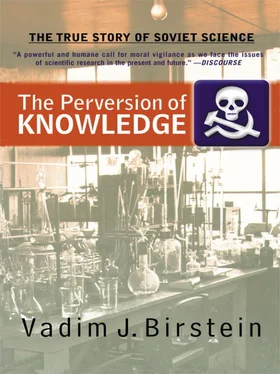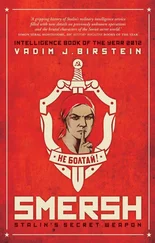However, the war against the Jews (as an ethnic group, not as a religion) started even earlier. During the 1939 secret Soviet-Nazi peace negotiations, Stalin told Nazi foreign minister Joachim Ribbentrop that the Soviet government was not interested in saving Polish Jews and that the Soviet leaders were just waiting until there were enough non-Jewish intellectuals so they could end the overwhelming presence of Jews in the Soviet administration. In 1943, a Plenum of the Central Committee issued a decree saying that the Russian nation (in an ethnic sense) was the leader in the USSR and that saving Jews from Nazi extermination was not a priority in the war. Following this decree, secret orders were issued to remove officers of Jewish descent from leading positions in the army and to list minimal numbers of Jews for military awards. 37
Also, this was not the first time Stalin used the “killer-doctor” image. Several famous doctors had been accused of killing high Party officials during Nikolai Bukharin’s trial in 1938. But that trial did not have an openly anti-Semitic character, although several of its major defendants were Jews. In 1951–1952, the situation was different. Taking into account Hitler’s successful extermination of European Jews, Stalin considered sending the Soviet Jews into exile and to special labor camps. Given the anti-Semitic hysteria that was growing in the country, he could easily use this stratagem to replace those in his closest political circle who had acquired too much power.
In 1951, Minister Viktor Abakumov, Mairanovsky’s and Sudoplatov’s superior in the MGB, became one of the first victims of this campaign. Although he was not a Jew, Abakumov was accused of creating a Jewish plot within the MGB. On November 18, 1950, Yakov Etinger, a Kremlin Hospital doctor, was the first arrested. 38Others were arrested later. All of them were accused of being part of the Jewish “Doctors’ Plot.” Allegedly, they planned to kill high Party officials during medical treatments. Not all of the arrested doctors were Jews, but it hardly mattered.
As epigraphs in the sections exposing Mairanovsky’s experiments, I give examples of comparable situations in Nazi Germany, including documents from the Nuremberg Doctors’ trial. The similarity of these events is striking.
Overall, it is clear that many in the Soviet scientific elite were involved in state crimes. Many in the academic establishment knew about Mairanovsky’s dreadful experiments and approved them, awarding him with scientific degrees and titles. Some of these people were internationally recognized as prominent scientists. Mairanovsky’s work was also connected with the development of biological and chemical weapons: He used components of these substances for his tests on humans.
Like Mairanovsky’s experiments, Soviet biological and chemical warfare military programs were under the control of the military, the Academy of Sciences, and the security service. Until recently, a special Inter-Agency Council coordinated efforts of the Ministries of Health, Agriculture, and Defense, the chemical industry, the KGB, and the Academy of Sciences in the development of biological weapons. 39Some leaders of the chemical and biological weapons programs had high military rank, in addition to bearing the title of academician. Unfortunately, even today the Western scientific community does not seem to understand how deeply science in the Soviet Union (and still currently in Russia) was controlled by the security service. 40This former Soviet scientific elite has managed to hold onto its status and privileges even now, amid the economic turmoil of the new Russia. Loren Graham, one of the main historians of Soviet and Russian science, recently wrote:
The scientists in the Soviet Union who controlled the Academy of Sciences lost most of their financial advantages after the country collapsed [in 1991], but they fought most strenuously to retain their nonmonetary perquisites and influences, especially their roles as the administrators and leaders of the science establishment. As a result, Russia is today the only major country in the world in which several hundred leading, and often quite senior, scientists, chosen by themselves, are in charge of the fundamental science establishment, directing its laboratories and institutes. They fiercely defend that privilege even at a time when they cannot pay the researchers who work in those laboratories and institutes. 41
I started my training in biology while Lysenko was still in power, and I remember Lysenkoist “professors”—usually Communist Party functionaries who falsified the results of their experiments or received their degrees for work completed by others. Some of these pseudoscientists were NKVD/MGB/KGB informers or officers. I also know the other side of this story. I knew personally those geneticists and evolutionists who did not make compromises with their consciences. Some of them spent many years in Soviet labor camps because of their anti-Lysenkoist positions. And I cannot forget the fate of the thousands of other scientists who became victims of the Soviet totalitarian regime, those who perished in Soviet labor camps, were shot to death, or died during OGPU/NKVD/MGB/KGB “interrogations” from the 1920s through the 1950s.
I have tried to present the material in this book as a personal issue. I would like each reader to ask: What would I do in such a situation? Would I accept the conditions of the regime, be loyal to it, and possibly become an informer if it would help my professional career? Or would I even go to work within the system of secret services, which would mean a good salary and a powerful position? Would I use convicts under death sentence for experiments? Or, as a scientist, would I review the results of such experiments? Would I maintain humanistic and moral values and even fight for them in a situation in which my activities would condemn not only myself but my family and friends as well?
To give a list of all Soviet scientists who were repressed by the secret police would be not only impossible but tedious.
—L. R. Graham,
What Have We Learned About Science and Technology from the Russian Experience?
AFTER THEIR SUCCESSFUL 1917 coup d’état, the Bolsheviks made control of scientists and other Russian intelligentsia one of their first priorities. Their primary concern was members of the intelligentsia who had participated in the Provisional Government, which existed between the February Revolution and the Bolshevik takeover in November. During this brief nine-month period, the Academy of Sciences, universities, and other scientific institutions became independent from state control for the first and last time in their history. The Bolsheviks were well aware that these professionals were capable of quickly understanding the naked desire for power behind their grand promises.
In 1928, a corresponding member of the academy (elected in 1927), the noted metallurgist Vladimir Grum-Grzhimailo (1864–1928) wrote a particularly prescient note to the Presidium of the Scientific Technical Directorate of the Council of People’s Commissars (Sovnarkom):
Marx’s theory is a backward hypothesis, which has already lost ground. It was created when muscular [physical] labor flourished and when almost zero technical and industrial knowledge was available. Now everything is changing, and I am absolutely convinced that in 50 years there will be no proletariat. The ideal of engineers is… a plant without workers. This will provide people with such abundance of life resources that there will be no need for the class struggle. Capitalism is very successful in introducing this future culture… But in fact the power in Russia is in the hands of Bolsheviks… [They] want to experiment with the creation of a Socialist state. The price for this will be extremely high… 1
Читать дальше











